英语高阶教程翻译(研究生英语课程)
- 格式:doc
- 大小:63.50 KB
- 文档页数:16
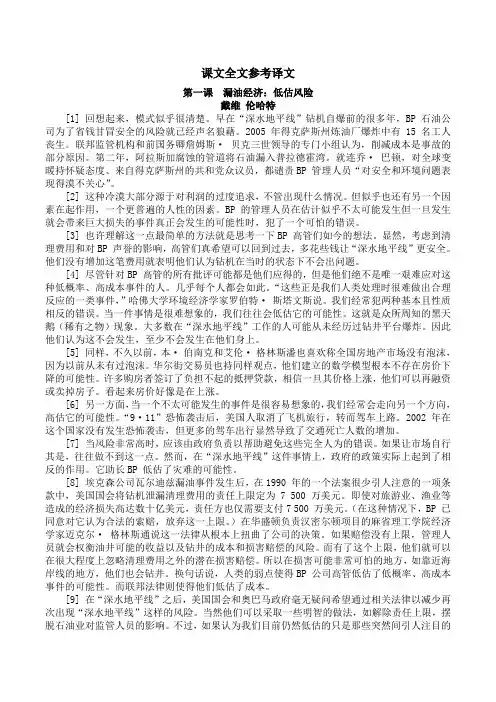
课文全文参考译文第一课漏油经济:低估风险戴维伦哈特[1] 回想起来,模式似乎很清楚。
早在“深水地平线”钻机自爆前的很多年,BP 石油公司为了省钱甘冒安全的风险就已经声名狼藉。
2005 年得克萨斯州炼油厂爆炸中有15 名工人丧生。
联邦监管机构和前国务卿詹姆斯·贝克三世领导的专门小组认为,削减成本是事故的部分原因。
第二年,阿拉斯加腐蚀的管道将石油漏入普拉德霍湾。
就连乔·巴顿,对全球变暖持怀疑态度、来自得克萨斯州的共和党众议员,都谴责BP 管理人员“对安全和环境问题表现得漠不关心”。
[2] 这种冷漠大部分源于对利润的过度追求,不管出现什么情况。
但似乎也还有另一个因素在起作用,一个更普遍的人性的因素。
BP 的管理人员在估计似乎不太可能发生但一旦发生就会带来巨大损失的事件真正会发生的可能性时,犯了一个可怕的错误。
[3] 也许理解这一点最简单的方法就是思考一下BP 高管们如今的想法。
显然,考虑到清理费用和对BP 声誉的影响,高管们真希望可以回到过去,多花些钱让“深水地平线”更安全。
他们没有增加这笔费用就表明他们认为钻机在当时的状态下不会出问题。
[4] 尽管针对BP 高管的所有批评可能都是他们应得的,但是他们绝不是唯一艰难应对这种低概率、高成本事件的人。
几乎每个人都会如此。
“这些正是我们人类处理时很难做出合理反应的一类事件,”哈佛大学环境经济学家罗伯特·斯塔文斯说。
我们经常犯两种基本且性质相反的错误。
当一件事情是很难想象的,我们往往会低估它的可能性。
这就是众所周知的黑天鹅(稀有之物)现象。
大多数在“深水地平线”工作的人可能从未经历过钻井平台爆炸。
因此他们认为这不会发生,至少不会发生在他们身上。
[5] 同样,不久以前,本·伯南克和艾伦·格林斯潘也喜欢称全国房地产市场没有泡沫,因为以前从未有过泡沫。
华尔街交易员也持同样观点,他们建立的数学模型根本不存在房价下降的可能性。
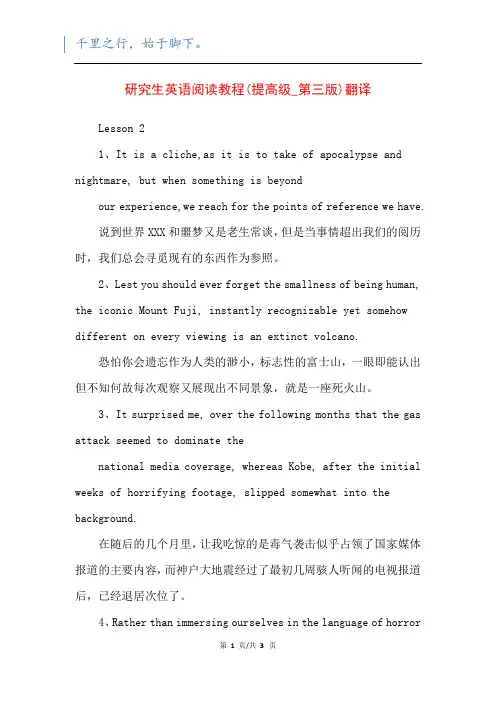
研究生英语阅读教程(提高级_第三版)翻译Lesson 21、It is a cliche,as it is to take of apocalypse and nightmare, but when something is beyondour experience,we reach for the points of reference we have.说到世界XXX和噩梦又是老生常谈,但是当事情超出我们的阅历时,我们总会寻觅现有的东西作为参照。
2、Lest you should ever forget the smallness of being human, the iconic Mount Fuji, instantly recognizable yet somehow different on every viewing is an extinct volcano.恐怕你会遗忘作为人类的渺小,标志性的富士山,一眼即能认出但不知何故每次观察又展现出不同景象,就是一座死火山。
3、It surprised me, over the following months that the gas attack seemed to dominate thenational media coverage, whereas Kobe, after the initial weeks of horrifying footage, slipped somewhat into the background.在随后的几个月里,让我吃惊的是毒气袭击似乎占领了国家媒体报道的主要内容,而神户大地震经过了最初几周骇人听闻的电视报道后,已经退居次位了。
4、Rather than immersing ourselves in the language of horrorfilms and the end of the world,when the time is right to try to glimpse this new territory, we might for thought reach fora book by Japan’s most popular contemporary novelist.我们不能沉醉在XXX片和世界XXX的语言中,在合适的时光,假如想要了解这一新的领域,我们可以考虑看看XXX最流行的现代小说家的一本书。
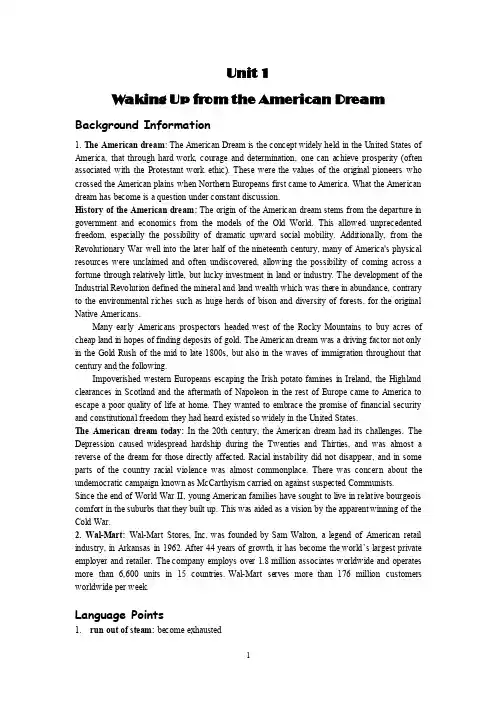
Unit 1Waking Up from the American Dream Background Information1. The American dream: The American Dream is the concept widely held in the United States of America, that through hard work, courage and determination, one can achieve prosperity (often associated with the Protestant work ethic). These were the values of the original pioneers who crossed the American plains when Northern Europeans first came to America. What the American dream has become is a question under constant discussion.History of the American dream: The origin of the American dream stems from the departure in government and economics from the models of the Old World. This allowed unprecedented freedom, especially the possibility of dramatic upward social mobility. Additionally, from the Revolutionary War well into the later half of the nineteenth century, many of America's physical resources were unclaimed and often undiscovered, allowing the possibility of coming across a fortune through relatively little, but lucky investment in land or industry. The development of the Industrial Revolution defined the mineral and land wealth which was there in abundance, contrary to the environmental riches such as huge herds of bison and diversity of forests, for the original Native Americans.Many early Americans prospectors headed west of the Rocky Mountains to buy acres of cheap land in hopes of finding deposits of gold. The American dream was a driving factor not only in the Gold Rush of the mid to late 1800s, but also in the waves of immigration throughout that century and the following.Impoverished western Europeans escaping the Irish potato famines in Ireland, the Highland clearances in Scotland and the aftermath of Napoleon in the rest of Europe came to America to escape a poor quality of life at home. They wanted to embrace the promise of financial security and constitutional freedom they had heard existed so widely in the United States.The American dream today: In the 20th century, the American dream had its challenges. The Depression caused widespread hardship during the Twenties and Thirties, and was almost a reverse of the dream for those directly affected. Racial instability did not disappear, and in some parts of the country racial violence was almost commonplace. There was concern about the undemocratic campaign known as McCarthyism carried on against suspected Communists. Since the end of World War II, young American families have sought to live in relative bourgeois comfort in the suburbs that they built up. This was aided as a vision by the apparent winning of the Cold War.2. Wal-Mart:Wal-Mart Stores, Inc. was founded by Sam Walton, a legend of American retail industry, in Arkansas in 1962. After 44 years of growth, it has become the world‘s largest private employer and retailer. The company employs over 1.8 million associates worldwide and operates more than 6,600 units in 15 countries. Wal-Mart serves more than 176 million customers worldwide per week.Language Points1.run out of steam: become exhausted2.Upward mobility diminished even more in the 1980s as globalization and technologyslammed blue-collar wages: ―Slammed‖ here means ―make…slip rapidly‖. 3.…minting dot-com millionaires by the thousands, …: A lot of people became millionairesby running websites in 1990s when the economy was booming.4.It’s hard to find a job with a career ladder these days, and a B.A. would be an edge: It‘shard to find a job that can provide opportunity to move up these days and those with a B.A.would have advantage over others.5.Restoring American mobility is less a question of knowing what to do than of making ithappen: Restoring American mobility is a question of making it happen rather than a question of knowing what to do.Answer keysI. Reading ComprehensionA. 1. A 2. D 3. D 4. C 5. A 6. D 7. C 8. D 9. A10. BB.Open.II. VocabularyA. 1. C 2. D 3. A 4. B 5. D 6. C 7. C 8. C 9. D 10. AB. 1. A 2. B 3. C 4. A 5. B 6. D 7. A8. D 9. B 10. C III. Cloze1. A2. B3. D4. A5. C6. A7. B8. C9. B 10. DIV. TranslationA. 壳牌公司努力构建的管理风格是让雇员直接参与影响其工作的决策。
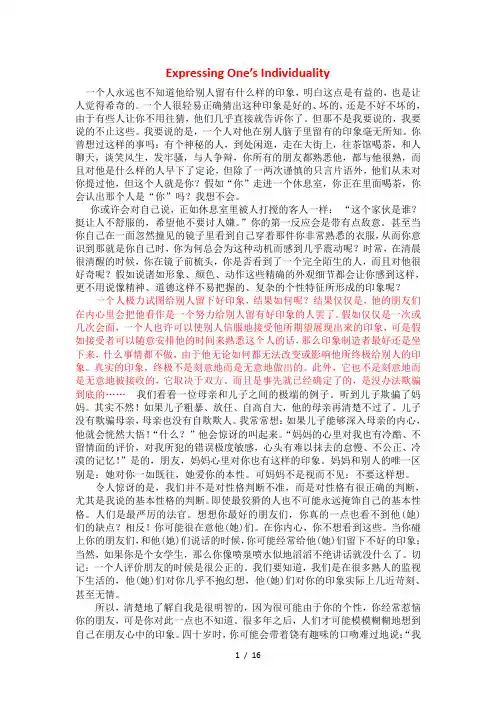
Expressing One’s Individuality一个人永远也不知道他给别人留有什么样的印象,明白这点是有益的,也是让人觉得希奇的。
一个人很轻易正确猜出这种印象是好的、坏的,还是不好不坏的,由于有些人让你不用往猜,他们几乎直接就告诉你了。
但那不是我要说的,我要说的不止这些。
我要说的是,一个人对他在别人脑子里留有的印象毫无所知。
你曾想过这样的事吗:有个神秘的人,到处闲逛,走在大街上,往茶馆喝茶,和人聊天,谈笑风生,发牢骚,与人争辩,你所有的朋友都熟悉他,都与他很熟,而且对他是什么样的人早下了定论,但除了一两次谨慎的只言片语外,他们从未对你提过他,但这个人就是你?假如“你”走进一个休息室,你正在里面喝茶,你会认出那个人是“你”吗?我想不会。
你或许会对自己说,正如休息室里被人打搅的客人一样:“这个家伙是谁?挺让人不舒服的,希望他不要讨人嫌。
”你的第一反应会是带有点敌意。
甚至当你自己在一面忽然撞见的镜子里看到自己穿着那件你非常熟悉的衣服,从而你意识到那就是你自己时,你为何总会为这种动机而感到几乎震动呢?时常,在清晨很清醒的时候,你在镜子前梳头,你是否看到了一个完全陌生的人,而且对他很好奇呢?假如说诸如形象、颜色、动作这些精确的外观细节都会让你感到这样,更不用说像精神、道德这样不易把握的、复杂的个性特征所形成的印象呢?一个人极力试图给别人留下好印象,结果如何呢?结果仅仅是,他的朋友们在内心里会把他看作是一个努力给别人留有好印象的人罢了。
假如仅仅是一次或几次会面,一个人也许可以使别人信服地接受他所期望展现出来的印象,可是假如接受者可以随意安排他的时间来熟悉这个人的话,那么印象制造者最好还是坐下来,什么事情都不做,由于他无论如何都无法改变或影响他所终极给别人的印象。
真实的印象,终极不是刻意地而是无意地做出的。
此外,它也不是刻意地而是无意地被接收的,它取决于双方。
而且是事先就已经确定了的,是没办法欺骗到底的……我们看看一位母亲和儿子之间的极端的例子。
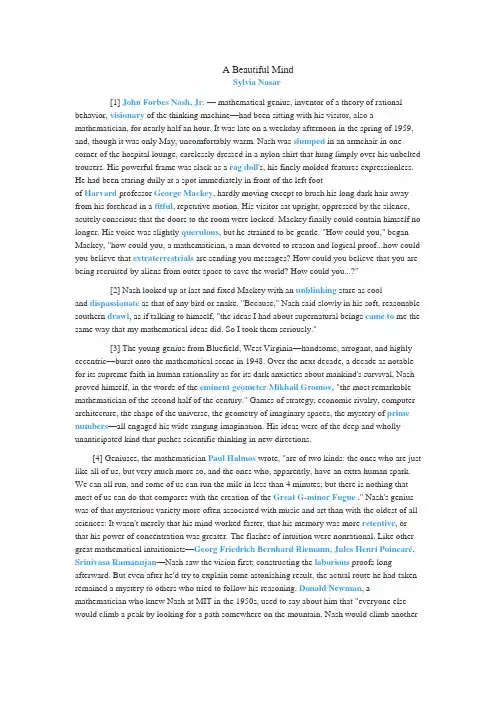
A Beautiful MindSylvia Nasar[1] John Forbes Nash, Jr.— mathematical genius, inventor of a theory of rational behavior, visionary of the thinking machine—had been sitting with his visitor, also a mathematician, for nearly half an hour. It was late on a weekday afternoon in the spring of 1959, and, though it was only May, uncomfortably warm. Nash was slumped in an armchair in one corner of the hospital lounge, carelessly dressed in a nylon shirt that hung limply over his unbelted trousers. His powerful frame was slack as a rag doll's, his finely molded features expressionless. He had been staring dully at a spot immediately in front of the left footof Harvard professor George Mackey, hardly moving except to brush his long dark hair away from his forehead in a fitful, repetitive motion. His visitor sat upright, oppressed by the silence, acutely conscious that the doors to the room were locked. Mackey finally could contain himself no longer. His voice was slightly querulous, but he strained to be gentle. "How could you," began Mackey, "how could you, a mathematician, a man devoted to reason and logical proof...how could you believe that extraterrestrials are sending you messages? How could you believe that you are being recruited by aliens from outer space to save the world? How could you...?"[2] Nash looked up at last and fixed Mackey with an unblinking stare as cooland dispassionate as that of any bird or snake. "Because," Nash said slowly in his soft, reasonable southern drawl, as if talking to himself, "the ideas I had about supernatural beings came to me the same way that my mathematical ideas did. So I took them seriously."[3] The young genius from Bluefield, West Virginia—handsome, arrogant, and highly eccentric—burst onto the mathematical scene in 1948. Over the next decade, a decade as notable for its supreme faith in human rationality as for its dark anxieties about mankind's survival, Nash proved himself, in the words of the eminent geometer Mikhail Gromov, "the most remarkable mathematician of the second half of the century." Games of strategy, economic rivalry, computer architecture, the shape of the universe, the geometry of imaginary spaces, the mystery of prime numbers—all engaged his wide-ranging imagination. His ideas were of the deep and wholly unanticipated kind that pushes scientific thinking in new directions.[4] Geniuses, the mathematician Paul Halmos wrote, "are of two kinds: the ones who are just like all of us, but very much more so, and the ones who, apparently, have an extra human spark. We can all run, and some of us can run the mile in less than 4 minutes; but there is nothing that most of us can do that compares with the creation of the Great G-minor Fugue ." Nash's genius was of that mysterious variety more often associated with music and art than with the oldest of all sciences: It wasn't merely that his mind worked faster, that his memory was more retentive, or that his power of concentration was greater. The flashes of intuition were nonrational. Like other great mathematical intuitionists—Georg Friedrich Bernhard Riemann, Jules Henri Poincaré, Srinivasa Ramanujan—Nash saw the vision first; constructing the laborious proofs long afterward. But even after he'd try to explain some astonishing result, the actual route he had taken remained a mystery to others who tried to follow his reasoning. Donald Newman, a mathematician who knew Nash at MIT in the 1950s, used to say about him that "everyone else would climb a peak by looking for a path somewhere on the mountain. Nash would climb anothermountain altogether and from that distant peak would shine a searchlight back onto the first peak".[5] No one was more obsessed with originality, more disdainful of authority, or more jealous of his independence. As a young man he was surrounded by the high priests of twentieth-century science—Albert Einstein, John von Neumann, and Norbert Wiener—but he joined no school, became no one's disciple, got along: largely without guides or followers. In almost everything he did—from game theory to geometry—he thumbed his nose at the received wisdom, current fashions, established methods. He almost always worked alone, in his head, usually walking, often whistling Bach. Nash acquired his knowledge of mathematics not mainly from studying what other mathematicians had discovered, but by rediscovering their truths for himself. Eager to astound, he was always on the lookout for the really big problems. When he focused on some new puzzle, he saw dimensions that people who really knew the subject (he never did) initially dismissed as naive or wrong-headed. Even as a student, his indifference to others' skepticism, doubt, and ridicule was awesome.[6] Nash's faith in rationality and the power of pure thought was extreme, even for a very young mathematician and even for the new age of computers, space travel, and nuclear weapons. Einstein once chided him for wishing to amend relativity theory without studying physics. His heroes were solitary thinkers and supermen like Newton and Nietzsche. Computers and science fiction were his passions. He considered "thinking machines", as he called them, superior in some ways to human beings. At one point, he became fascinated by the possibility that drugs could heighten physical and intellectual performance. He was beguiled by the idea of alien races of hyper-rational beings who had taught themselves to disregard allemotion. Compulsively rational, he wished to turn life's decisions—whether to take the first elevator or wait for the next one, where to bank his money, what job to accept, whether to marry—into calculations of advantage and disadvantage, algorithms or mathematical rules divorced from emotion, convention, and tradition. Even the small act of saying an automatic hello to Nash in a hallway could elicit a furious "Why are you saying hello to me?"[7] His contemporaries, on the whole, found him immensely strange. They described him as "aloof", "haughty", "without affect", "detached", "spooky", "isolated", and "queer". Nash mingled rather than mixed with his peers. Preoccupied with his own private reality, he seemed not to share their mundane concerns. His manner—slightly cold, a bit superior, somewhat secretive—suggested something "mysterious and unnatural". His remoteness was punctuated by flights of garrulousness about outer space and geopolitical trends, childish pranks, and unpredictable eruptions of anger. But these outbursts were, more often than not, as enigmatic as his silences. "He is not one of us" was a constant refrain. A mathematician at the Institute for Advanced Study remembers meeting Nash for the first time at a crowded student party at Princeton:I noticed him very definitely among a lot of other people who were there. He was sitting on the floor in a half-circle discussing something. He made me feel uneasy. He gave me a peculiar feeling. I had a feeling of a certain strangeness. He was different in some way. I was not aware of the extent of his talent. I had no idea he would contribute as much as he really did.[8] But he did contribute, in a big way. The marvelous paradox was that the ideas themselves were not obscure. In 1958, Fortune singled Nash out for his achievements in game theory, algebraic geometry, and nonlinear theory, calling him the most brilliant of the younger generation of new ambidextrous mathematicians who worked in both pure and applied mathematics. Nash's insight into the dynamics of human rivalry—his theory of rational conflict and cooperation—was to become one of the most influential ideas of the twentieth century, transforming the young science of economics the way that Mendel's ideas of genetic transmission, Darwin's model of natural selection, and Newton's celestial mechanics reshaped biology and physics in their day.第六课美丽心灵西尔维亚•纳萨尔[1]小约翰•福布斯•纳什,数学天才、理性行为理论创立者、预见会思考的机器出现的预言者,已经和他的同样是数学家的来访者一起坐了差不多半个小时。
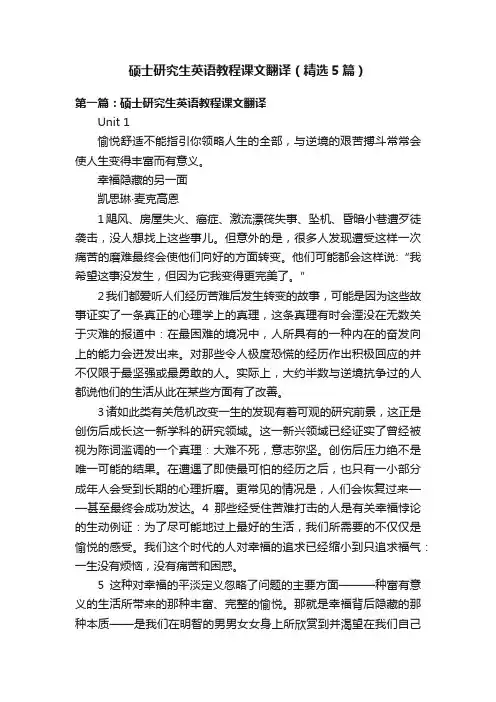
硕士研究生英语教程课文翻译(精选5篇)第一篇:硕士研究生英语教程课文翻译Unit 1愉悦舒适不能指引你领略人生的全部,与逆境的艰苦搏斗常常会使人生变得丰富而有意义。
幸福隐藏的另一面凯思琳·麦克高恩1飓风、房屋失火、癌症、激流漂筏失事、坠机、昏暗小巷遭歹徒袭击,没人想找上这些事儿。
但意外的是,很多人发现遭受这样一次痛苦的磨难最终会使他们向好的方面转变。
他们可能都会这样说:“我希望这事没发生,但因为它我变得更完美了。
”2我们都爱听人们经历苦难后发生转变的故事,可能是因为这些故事证实了一条真正的心理学上的真理,这条真理有时会湮没在无数关于灾难的报道中:在最困难的境况中,人所具有的一种内在的奋发向上的能力会迸发出来。
对那些令人极度恐慌的经历作出积极回应的并不仅限于最坚强或最勇敢的人。
实际上,大约半数与逆境抗争过的人都说他们的生活从此在某些方面有了改善。
3诸如此类有关危机改变一生的发现有着可观的研究前景,这正是创伤后成长这一新学科的研究领域。
这一新兴领域已经证实了曾经被视为陈词滥调的一个真理:大难不死,意志弥坚。
创伤后压力绝不是唯一可能的结果。
在遭遇了即使最可怕的经历之后,也只有一小部分成年人会受到长期的心理折磨。
更常见的情况是,人们会恢复过来——甚至最终会成功发达。
4那些经受住苦难打击的人是有关幸福悖论的生动例证:为了尽可能地过上最好的生活,我们所需要的不仅仅是愉悦的感受。
我们这个时代的人对幸福的追求已经缩小到只追求福气:一生没有烦恼,没有痛苦和困惑。
5这种对幸福的平淡定义忽略了问题的主要方面———种富有意义的生活所带来的那种丰富、完整的愉悦。
那就是幸福背后隐藏的那种本质——是我们在明智的男男女女身上所欣赏到并渴望在我们自己生活中培育的那种不可言喻的品质。
事实证明,一些遭受苦难最多的人——他们被迫全力应付他们未曾预料到的打击,并重新思考他们生活的意义——或许对那种深刻的、给人以强烈满足感的人生经历(哲学家们过去称之为对“美好生活”的探寻)最有发言权。
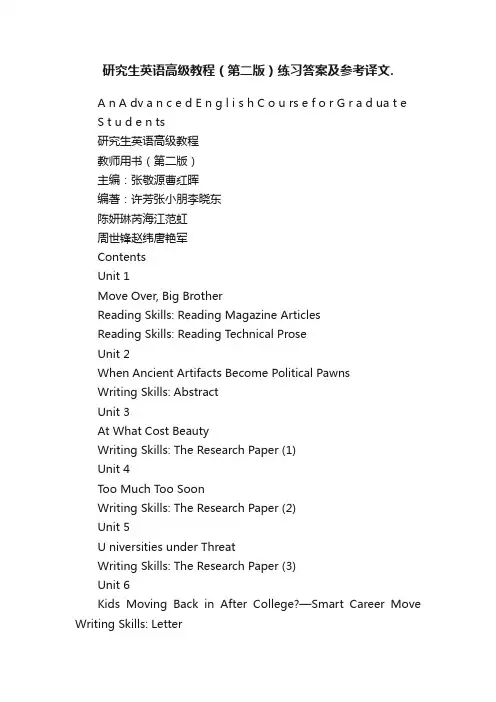
研究生英语高级教程(第二版)练习答案及参考译文.A n A dv a n c e d E n g l i s h C o u rs e f o r G r a d ua t eS t u d e n ts研究生英语高级教程教师用书(第二版)主编:张敬源曹红晖编著:许芳张小朋李晓东陈妍琳芮海江范虹周世锋赵纬唐艳军ContentsUnit 1Move Over, Big BrotherReading Skills: Reading Magazine ArticlesReading Skills: Reading Technical ProseUnit 2When Ancient Artifacts Become Political PawnsWriting Skills: AbstractUnit 3At What Cost BeautyWriting Skills: The Research Paper (1)Unit 4Too Much Too SoonWriting Skills: The Research Paper (2)Unit 5U niversities under ThreatWriting Skills: The Research Paper (3)Unit 6Kids Moving Back in After College?—Smart Career Move Writing Skills: LetterWriting Skills: Curriculum Vitae (CV) & Personal Statement Unit 7Think DifferentTranslation Skills: Translation of Vocabulary: Word Classes Unit 8How to Live in the 21st CenturyTranslation Skills: Subordinate Clauses (1)—Nominal Clauses Unit 9The Global food CrisisTranslation Skills: Subordinate Clauses (2)—Attributive Clauses Unit 10How Reading Makes Us More HumanTranslation Skills: Subordinate Clauses (3)—Adverbial ClausesUnit 11The New Science of Happiness Translation Skills: Long Sentences Unit 12A Time for Men to Stand Up Translation Skills: Technical Translation Revision: Self-assessment TestUnit 1Move Over, Big BrotherBackground Information1. Big Brother: An omnipresent, seemingly benevolent figure representing the oppressive control over individual lives exerted by an authoritarian government. (after Big Brother, a character in the novel 1984 by George Orwell)2. Louis XIV: King of France (1643–1715). His reign, the longest in French history, was characterized by a magnificent court and the expansion of French influence in Europe. Louis waged three major wars: the Dutch War (1672–1678), the War ofthe Grand Alliance (1688–1697), and the War of the Spanish Succession (1701–1714).3. sousveillance : “sous” is a French prefix meaning “under”.4. Rodney King: "Rodney" Glen King (born April 2, 1965 in Sacramento, California) was an African-American motorist who, while videotaped by a bystander (George Holliday), was struck repeatedly by Los Angeles police officers (LAPD) during a police stop on March 3, 1991. The incident raised an outcry, as many people, both within and outside the African-American community, believed that the beating was racially motivated, excessive and an example of police brutality. The acquittal in a state court of four officers charged with using excessive force in subduing King led to the 1992 Los Angeles riots and mass protest around the country.5. Abu Ghraib jail in Iraq: In 2004, reports emerged of numerous instances of abuse and torture of prisoners in the Baghdad Correctional Facility, formerly Abu Ghraib Prison, by personnel of the U.S. armed forces, CIA officers and contractors involved in the occupation of Iraq, beginning in 2003.6. Peeping T om: A person who secretly watches others, especially for sexual gratification; a voyeur. This expression, first recorded in 1796, alludes to the legend of the tailor Tom, the only person to watch the naked Lady Godiva as she rode by and who was struck blind for this sin.Answer keysI. Reading comprehension1. B2. C3. D4. A5. D6. B7. D8. B9. D 10.CⅡ. Vocabular yA. 1. C 2. A 3. A 4. D 5. A 6. B 7. B 8. A 9. C 10. DB. 1. A 2. D 3. C 4. C 5. D 6. C 7. A 8. D 9. D 10. B Ⅲ. Cloze1. C2. D3. B4. B5. B6. A7. C8. A9. D 10. DⅣ. Translation。
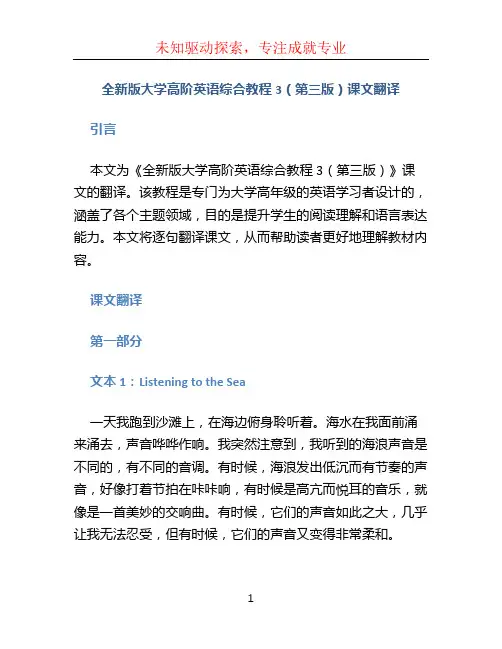
全新版大学高阶英语综合教程3(第三版)课文翻译引言本文为《全新版大学高阶英语综合教程3(第三版)》课文的翻译。
该教程是专门为大学高年级的英语学习者设计的,涵盖了各个主题领域,目的是提升学生的阅读理解和语言表达能力。
本文将逐句翻译课文,从而帮助读者更好地理解教材内容。
课文翻译第一部分文本1:Listening to the Sea一天我跑到沙滩上,在海边俯身聆听着。
海水在我面前涌来涌去,声音哗哗作响。
我突然注意到,我听到的海浪声音是不同的,有不同的音调。
有时候,海浪发出低沉而有节奏的声音,好像打着节拍在咔咔响,有时候是高亢而悦耳的音乐,就像是一首美妙的交响曲。
有时候,它们的声音如此之大,几乎让我无法忍受,但有时候,它们的声音又变得非常柔和。
我闭上了眼睛,让自己陶醉于这美妙的声音中。
我能感受到海浪的节奏和韵律。
它们就像大自然为我们带来的一首首华丽的交响曲,让我们在忙碌的生活中得到片刻安宁。
第二部分文本2:The Future House随着技术的飞速发展,人们对未来的居住环境充满了无限的想象和向往。
在不久的将来,我们的家可能不再是传统的房屋,而是创新的、智能化的建筑。
未来的家将能够根据居住者的需求自动调节温度、湿度和照明等各种环境条件。
它们将拥有先进的智能控制系统,可以通过语音、触摸和手机应用来控制各种设备。
而且,这些设备还能够相互连接,形成一个智能家庭网络。
比如,你可以通过智能手机控制家中的温度、打开窗帘,还可以和家中的其他设备进行互动。
未来的家还将采用更环保的建筑材料,并具备节能和回收利用的功能。
例如,屋顶上可以安装太阳能板,以供给家中的电力使用。
废物处理系统将变得更加高效,废水和垃圾将得到有效的处理和利用。
这不仅有利于环境保护,还能降低居住成本。
总之,未来的家将成为一个智能、环保和舒适的环境,为居住者创造更好的生活品质。
结论本文通过逐句翻译的方式将《全新版大学高阶英语综合教程3(第三版)》中两篇课文进行了翻译。
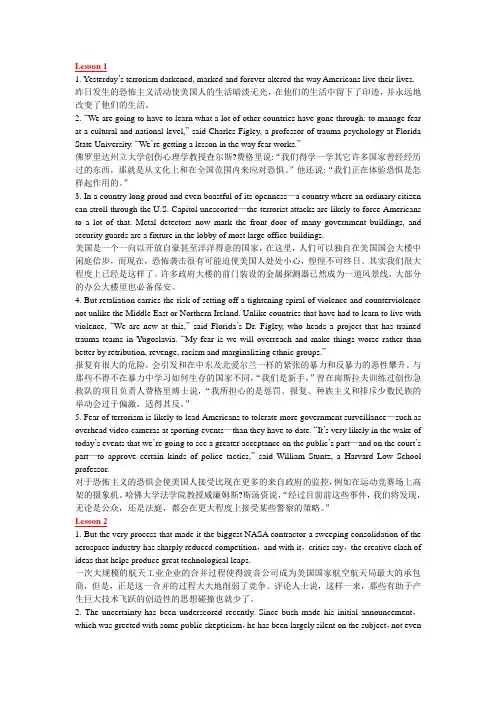
Lesson 11. Yesterday’s terrorism darkened, marked and forever altered the way Americans live their lives. 昨日发生的恐怖主义活动使美国人的生活暗淡无光,在他们的生活中留下了印迹,并永远地改变了他们的生活。
2. “We are going to have to learn what a lot of other countries have gone through: to manage fear at a cultural and national level,” said Charles Figley, a professor of trauma psychology at Florida State University. “We’re getting a lesson in the way fear works.”佛罗里达州立大学创伤心理学教授查尔斯?费格里说:“我们得学一学其它许多国家曾经经历过的东西,那就是从文化上和在全国范围内来应对恐惧。
”他还说:“我们正在体验恐惧是怎样起作用的。
”3. In a country long proud and even boastful of its openness—a country where an ordinary citizen can stroll through the U.S. Capitol unescorted—the terrorist attacks are likely to force Americans to a lot of that. Metal detectors now mark the front door of many government buildings, and security guards are a fixture in the lobby of most large office buildings.美国是一个一向以开放自豪甚至洋洋得意的国家,在这里,人们可以独自在美国国会大楼中闲庭信步,而现在,恐怖袭击很有可能迫使美国人处处小心,惶惶不可终日。
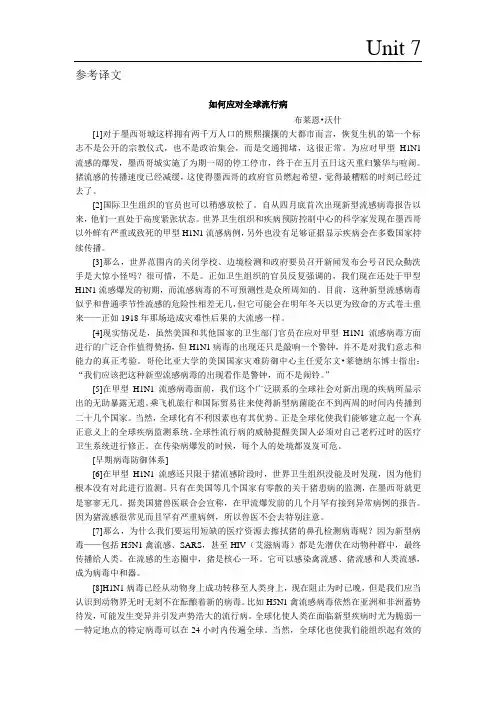
参考译文如何应对全球流行病布莱恩•沃什[1]对于墨西哥城这样拥有两千万人口的熙熙攘攘的大都市而言,恢复生机的第一个标志不是公开的宗教仪式,也不是政治集会,而是交通拥堵,这很正常。
为应对甲型H1N1流感的爆发,墨西哥城实施了为期一周的停工停市,终于在五月五日这天重归繁华与喧闹。
猪流感的传播速度已经减缓,这使得墨西哥的政府官员燃起希望,觉得最糟糕的时刻已经过去了。
[2]国际卫生组织的官员也可以稍感放松了。
自从四月底首次出现新型流感病毒报告以来,他们一直处于高度紧张状态。
世界卫生组织和疾病预防控制中心的科学家发现在墨西哥以外鲜有严重或致死的甲型H1N1流感病例,另外也没有足够证据显示疾病会在多数国家持续传播。
[3]那么,世界范围内的关闭学校、边境检测和政府要员召开新闻发布会号召民众勤洗手是大惊小怪吗?很可惜,不是。
正如卫生组织的官员反复强调的,我们现在还处于甲型H1N1流感爆发的初期,而流感病毒的不可预测性是众所周知的。
目前,这种新型流感病毒似乎和普通季节性流感的危险性相差无几,但它可能会在明年冬天以更为致命的方式卷土重来——正如1918年那场造成灾难性后果的大流感一样。
[4]现实情况是,虽然美国和其他国家的卫生部门官员在应对甲型H1N1流感病毒方面进行的广泛合作值得赞扬,但H1N1病毒的出现还只是敲响一个警钟,并不是对我们意志和能力的真正考验。
哥伦比亚大学的美国国家灾难防御中心主任爱尔文•莱德纳尔博士指出:“我们应该把这种新型流感病毒的出现看作是警钟,而不是闹铃。
”[5]在甲型H1N1流感病毒面前,我们这个广泛联系的全球社会对新出现的疾病所显示出的无助暴露无遗。
乘飞机旅行和国际贸易往来使得新型病菌能在不到两周的时间内传播到二十几个国家。
当然,全球化有不利因素也有其优势。
正是全球化使我们能够建立起一个真正意义上的全球疾病监测系统。
全球性流行病的威胁提醒美国人必须对自己老朽过时的医疗卫生系统进行修正。
在传染病爆发的时候,每个人的处境都岌岌可危。
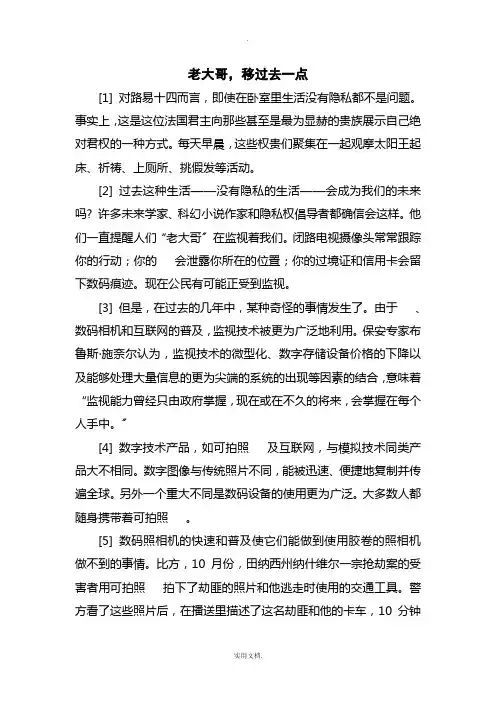
老大哥,移过去一点[1] 对路易十四而言,即使在卧室里生活没有隐私都不是问题。
事实上,这是这位法国君主向那些甚至是最为显赫的贵族展示自己绝对君权的一种方式。
每天早晨,这些权贵们聚集在一起观摩太阳王起床、祈祷、上厕所、挑假发等活动。
[2] 过去这种生活——没有隐私的生活——会成为我们的未来吗? 许多未来学家、科幻小说作家和隐私权倡导者都确信会这样。
他们一直提醒人们“老大哥〞在监视着我们。
闭路电视摄像头常常跟踪你的行动;你的会泄露你所在的位置;你的过境证和信用卡会留下数码痕迹。
现在公民有可能正受到监视。
[3] 但是,在过去的几年中,某种奇怪的事情发生了。
由于、数码相机和互联网的普及,监视技术被更为广泛地利用。
保安专家布鲁斯·施奈尔认为,监视技术的微型化、数字存储设备价格的下降以及能够处理大量信息的更为尖端的系统的出现等因素的结合,意味着“监视能力曾经只由政府掌握,现在或在不久的将来,会掌握在每个人手中。
〞[4] 数字技术产品,如可拍照及互联网,与模拟技术同类产品大不相同。
数字图像与传统照片不同,能被迅速、便捷地复制并传遍全球。
另外一个重大不同是数码设备的使用更为广泛。
大多数人都随身携带着可拍照。
[5] 数码照相机的快速和普及使它们能做到使用胶卷的照相机做不到的事情。
比方,10月份,田纳西州纳什维尔一宗抢劫案的受害者用可拍照拍下了劫匪的照片和他逃走时使用的交通工具。
警方看了这些照片后,在播送里描述了这名劫匪和他的卡车,10分钟后,此人便被抓获。
[6] 然而,监视行为的群众化有利有弊。
可拍照导致了窥淫癖现象,从而导致了维护个人形象权的新法规的出台。
9月份,美国国会通过了“防止录像窥淫法〞,该法案禁止在未经本人同意的情况下对其裸露身体的各个部位或内衣拍照。
该法案的出台是由于可拍照的普及以及在卧室、公共浴室、卫生间和更衣室出现隐蔽摄像头事件的增加。
同样,德国议会也通过了一项议案,禁止未经授权在建筑物内拍照。
研究生英语读写教程提高级译文研究生英语读写教程提高级译文:Unit 1: Academic Reading Strategies1.1 Skimming and ScanningSkimming and scanning techniques are important for efficient academic reading. Skimming involves quickly reading through a text to get a general idea of its content. Scanning, on the other hand, involves searching for specific information by quickly moving the eyes over the text. These strategies help students identify the main points, key details, and relevant information in an academic text.1.2 Annotating and Note-TakingAnnotating and note-taking are crucial skills for effective reading comprehension. Annotation involves underlining or highlighting important information, writing brief summaries or key words in the margins, and asking questions to engage with the text. Note-taking entails jotting down key points, organizing them in a logical manner, and using abbreviations and symbols to save time. These techniques aid in remembering and reviewing the material.Unit 2: Critical Reading and Thinking2.1 Analyzing ArgumentsCritical reading requires the analysis of arguments presented in academic texts. Students must identify the main claim, supporting evidence, and logical fallacies in an argument. They need to assess the validity and credibility of the information provided and evaluate the strength of the author's reasoning. This skill allows students to engage with the text critically and form their own opinions.2.2 Evaluating SourcesEvaluating sources is crucial to ensure the credibility and reliability of information. Students must assess the author's credentials, the publication date, the reputation of the publisher, and any potential biases. They need to consider whether the source is scholarly, peer-reviewed, or from a reputable institution. This skill helps students differentiate between credible sources and unreliable ones.Unit 3: Research Skills3.1 Effective Library UseUsing library resources effectively is essential for successful research. Students must learn how to navigate library catalogs, databases, and search engines to find relevant sources. They need to understand how to use advanced search techniques, such as Boolean operators and truncation, to refine their search results. This skill enables students to locate and retrieve the appropriate materialsfor their research.3.2 Proper Citation and ReferencingProper citation and referencing are necessary to acknowledge the sources used in academic writing. Students must learn the rules and conventions of various citation styles, such as APA, MLA, or Chicago. They need to understand how to format in-text citations, create reference lists, and avoid plagiarism. This skill ensures the integrity and credibility of their research.Unit 4: Academic Writing Skills4.1 Essay Structure and OrganizationMastering essay structure and organization is essential for effective academic writing. Students should learn how to create a clear and concise introduction, develop coherent body paragraphs, and present a logical conclusion. They need to understand the importance of topic sentences, supporting evidence, and transition words in constructing an argument. This skill enhances the clarity and coherence of their written work.4.2 Writing Style and VocabularyDeveloping an appropriate writing style and expanding vocabulary are crucial for academic writing. Students must aim for a formal tone, avoid colloquial expressions, and use discipline-specific terminology. They need to use a variety of sentence structures, demonstrate critical thinking, and present their ideas in a clear and concise manner. This skill helps students effectively communicate their thoughts and arguments.注:以上译文仅供参考,具体翻译请根据需要和语境进行调整和修正。
英语高阶教程下册课文翻译第一单元为什么我们爱上了自己的爱人By Dr. Joyce Brothers你知道吗?一对已婚夫妇曾经看起来本不那么合适——而现在,他们都享受着婚姻生活,你知道其中缘由吗?我就认识这么一对夫妻:他,身材健壮的前退役运动员,还是个出色的销售员,在少年联盟球队(Little League)当教练,活跃于扶轮社(Rotary Club),每周六都和朋友打高尔夫球。
而她,纤细安静,完全就是个居家女子,甚至都不喜欢和朋友外出吃饭。
是何种神秘的力量使我们投入另一个人的怀抱?同时,还使我们不再爱其他任何人,即便在没有偏见的旁人眼中他们和我们的爱人看上去应同样合我们心意?根据曾在约翰斯·霍普金斯大学从事医学心理学和儿科学的名誉退休教授约翰·莫奈的研究,在影响我们择偶的诸多因素中,最说明问题的是一种被称为“爱图”的东西:它是我们大脑中的一组编码信息,记载着我们的爱憎。
据约翰.霍普金斯大学医学心理学科学院院士John Money教授说,我们心目种理想伴侣的形象,受到很多因素影响,其中最关键的一项,就是他所说的“爱情地图”——将自己喜欢什么讨厌什么,在脑中编码而成一组信息。
显示我们对头发和眼睛颜色的偏好,还有声音,气味,身材。
还记录了吸引我们的那种性格,无论是温柔友善型还是寡言坚强型。
简单来说,我们爱上那些最符合自己爱情地图的类型,然后展开追求。
爱情地图很大程度都是由童年经历决定。
到八岁为止,我们理想伴侣在脑中已经初具雏形。
我做演讲时,时常会提问观众,是什么,吸引他们爱上自己的伴侣或者另一半。
得到的答案大相径庭:“她非常坚强而且独立”,“我喜欢他/她的红头发”,“我爱他的幽默感”,“就是因为,他坏坏的笑。
”我相信他们所说的。
但是我也猜得到,如果我再让同一个男人或者女人去形容他们的母亲,他们的另一半和自己母亲之间会有很多相似点。
是的,我们的母亲——我们生命中第一位真爱——在我们爱情地图上画了很大一部分。
I fear I cannot picture America as altogether an Elysium—perhaps, from the ordinary standpoint I know but little about the country. I cannot give its latitude or longitude; I cannotcompute the value of its dry goods, and I have no very close acquaintance with its politics. These are matters which may not interest you, and they certainly are not interesting to me.我恐怕不能把美国描绘成十足的天堂-- 从一般的角度来说,也许我对这个国家所知甚少。
我说不出它的经、纬度;我算不来它出产谷物的价值;我对它的政治也不十分熟悉。
这些东西可能不会使你们感兴趣,它们当然也不会让我感兴趣。
The first thing that struck me on landing in America was that if the Americans are not the mostwell-dressed people in the world, they are the most comfortably dressed. Men are seen therewith the dreadful chimney-pot hat, but there are very few hatless men; men wear the shockingswallow-tail coat, but few are to be seen with no coat at all. There is an air of comfort in theappearance of the people which is a marked contrast to that seen in this country, where, toooften, people are seen in close contact with rags.在美国上岸后得到的第一个深刻印象,就是美国人可能算不上是世界上穿得最漂亮的,但却是穿得最舒服的民族。
新探索研究生英语(提高级)读写教程课文翻译摘要:I.引言- 介绍新探索研究生英语(提高级)读写教程的课文翻译。
II.教程内容- 概述教程的各个单元和主题。
- 强调教程的针对性和实用性。
III.课文翻译实践- 分析教程中课文翻译的难点和重点。
- 介绍解决翻译问题的方法和技巧。
- 强调翻译实践对于提高英语读写能力的重要性。
IV.教程效果及评价- 总结教程在提高研究生英语读写能力方面的成效。
- 给出对教程的客观评价。
V.结论- 总结全文,强调新探索研究生英语(提高级)读写教程课文翻译的价值。
正文:新探索研究生英语(提高级)读写教程的课文翻译部分对于提高研究生的英语读写能力具有重要意义。
本教程根据研究生公共英语课堂教学和学生自学的需要,组织编写了围绕与同学们的学习、生活和将来的工作密切相关的五大主题:人文与社科、经济与管理、生命与健康、科学与技术、环境与能源。
教程课文翻译实践分析了教程中课文翻译的难点和重点,介绍解决翻译问题的方法和技巧,强调翻译实践对于提高英语读写能力的重要性。
教程中的课文翻译涵盖了各个学科专业,内容新颖、时效性强、具有批判性和语言的规范性,能够激发学生的兴趣并引起学生展开讨论。
此外,教程还注重培养学生的独立思考能力和团队合作精神,通过课文翻译实践,让学生学会如何准确、流畅地表达观点和想法。
新探索研究生英语(提高级)读写教程课文翻译部分在提高研究生英语读写能力方面成效显著。
经过一定时间的实践和学习,研究生们在英语表达能力和阅读理解能力上都有了明显的提高。
总体来说,教程在内容设置、教学方法等方面都表现出较高的质量,值得推广和应用。
总之,新探索研究生英语(提高级)读写教程课文翻译为学生提供了一个实用的英语学习平台,帮助他们在学术研究和未来工作中更好地运用英语。
英语高阶教程(陈静)第五单元中文翻译English Belongs to Everybody这是一个人们普遍为这门语言担忧的时代。
有些美国人害怕英语被西班牙语吞没或者冲击,于是想将它确定为官方语言。
有人担心文盲危机,或者说高中甚至大学毕业生中出现半文盲危机。
但是,这种担忧也许会产生一种恶劣的副作用:想“拯救”英语的专家也许只会让人们不要在英语中寻找乐趣。
他们中有幽默和容忍变化之人,也有苛刻和自命高雅之人。
语言会加强人们关于社会地位优越或低下的情感;制造圈内人和圈外人的差异;还可以成为虚荣心的道具和焦虑的源泉,而自命高雅者对这两种的感情的影响兼而有之。
然而,激怒他们的语言的变化和语用错误,其实与那些几个世纪以来对我们的语言的发展起作用的变化和错误没什么差别。
正如休·肯纳在其《沉没的岛屿》一书中评价某些英国批评家那样,“只是在语言激怒他们的时候,他们才关注语言。
”这样的人真是大煞风景之辈:他们使人们不要对英语感兴趣,抑制人们使用英语,使人们扫兴。
对于一门活生生的语言来说,变化是不可避免的,这也正是英语生机勃勃的原因之所在;它能够发展壮大的原因是其接受并吸纳变化的能力。
随着人们成长变化、从事新的活动,他们的语言也随之发展变化。
他们会发现描述新事物的方式,他们的新视角会使他们找到谈论旧事物的新方式。
例如,电灯开关的一开一关制造了关于人类最古老的生活经验的一个绝佳隐喻—“性吸引”或“性排斥”。
对于语言保守分子来说,这些表达方式显得低俗、带有俚语气息;而其他人却认为它们生动活泼,就像新出炉的钱币,既可花又“时髦”。
对语言变化的容忍不仅代表了自从伊莉莎白时期以来讲英语的民族的勃勃生机,而且代表了他们根深蒂固的对自由的看法。
这是英语语言权威之一、丹麦大学者奥托·叶斯柏森的观点。
他于1905年在其《英语语言的发展与结构》一书中这样写道:法语像路易十四时期的呆板的法国花园,而英语则像一个英国公园,它看似没有明确的设计规划,你可以随心所欲地徜徉其中,不用担心有严酷的看门人来管这管那。
Expressing One’s Individuality一个人永远也不知道他给别人留有什么样的印象,明白这点是有益的,也是让人觉得希奇的。
一个人很轻易正确猜出这种印象是好的、坏的,还是不好不坏的,由于有些人让你不用往猜,他们几乎直接就告诉你了。
但那不是我要说的,我要说的不止这些。
我要说的是,一个人对他在别人脑子里留有的印象毫无所知。
你曾想过这样的事吗:有个神秘的人,到处闲逛,走在大街上,往茶馆喝茶,和人聊天,谈笑风生,发牢骚,与人争辩,你所有的朋友都熟悉他,都与他很熟,而且对他是什么样的人早下了定论,但除了一两次谨慎的只言片语外,他们从未对你提过他,但这个人就是你?假如“你”走进一个休息室,你正在里面喝茶,你会认出那个人是“你”吗?我想不会。
你或许会对自己说,正如休息室里被人打搅的客人一样:“这个家伙是谁?挺让人不舒服的,希看他不要讨人嫌。
”你的第一反应会是带有点敌意。
甚至当你自己在一面忽然撞见的镜子里看到自己穿着那件你非常熟悉的衣服,从而你意识到那就是你自己时,你为何总会为这种动机而感到几乎震动呢?时常,在清晨很清醒的时候,你在镜子前梳头,你是否看到了一个完全陌生的人,而且对他很好奇呢?假如说诸如形象、颜色、动作这些精确的外观细节都会让你感到这样,更不用说像精神、道德这样不易把握的、复杂的个性特征所形成的印象呢?一个人极力试图给别人留下好印象,结果如何呢?结果仅仅是,他的朋友们在内心里会把他看作是一个努力给别人留有好印象的人罢了。
假如仅仅是一次或几次会面,一个人也许可以使别人信服地接受他所期望展现出来的印象,可是假如接受者可以随意安排他的时间来熟悉这个人的话,那么印象制造者最好还是坐下来,什么事情都不做,由于他无论如何都无法改变或影响他所终极给别人的印象。
真实的印象,终极不是刻意地而是无意地做出的。
此外,它也不是刻意地而是无意地被接收的,它取决于双方。
而且是事先就已经确定了的,是没办法欺骗到底的……我们看看一位母亲和儿子之间的极端的例子。
听到儿子欺骗了妈妈。
其实不然!如果儿子粗暴、放任、自高自大,他的母亲再清楚不过了。
儿子没有欺骗母亲,母亲也没有自欺欺人。
我常常想:如果儿子能够深入母亲的内心,他就会恍然大悟!“什么?”他会惊讶的叫起来。
“妈妈的心里对我也有冷酷、不留情面的评价,对我所犯的错误极度敏感,心头有难以抹去的怠慢、不公正、冷漠的记忆!”是的,朋友,妈妈心里对你也有这样的印象。
妈妈和别人的唯一区别是:她对你一如既往,她爱你的本性。
可妈妈不是视而不见:不要这样想。
令人惊讶的是,我们并不是对性格判断不准,而是对性格有很正确的判断,尤其是我说的基本性格的判断。
即使最狡猾的人也不可能永远掩饰自己的基本性格。
人们是最严厉的法官。
想想你最好的朋友们,你真的一点也看不到他(她)们的缺点?相反!你可能很在意他(她)们。
在你内心,你不想看到这些。
当你碰上你的朋友们,和他(她)们说话的时候,你可能经常给他(她)们留下不好的印象;当然,如果你是个女学生,那么你像喷泉喷水似地滔滔不绝讲话就没什么了。
切记:一个人评价朋友的时候是很公正的。
我们要知道,我们是在很多熟人的监视下生活的,他(她)们对你几乎不抱幻想,他(她)们对你的印象实际上几近苛刻、甚至无情。
所以,清楚地了解自我是很明智的,因为很可能由于你的个性,你经常惹恼你的朋友,可是你对此一点也不知道。
很多年之后,人们才可能模模糊糊地想到自己在朋友心中的印象。
四十岁时,你可能会带着饶有趣味的口吻难过地说:“我以前可能太无礼了。
我现在知道我为什么惹他(她)们生气了。
可是那时候我一点也没发觉。
我没有恶意,只是当时我懂得太少了。
”人们想到自己曾经有过粗暴的行为,后悔不已……这很好;随着年龄的增长,人们意识到自己曾经有些行为不适,难能可贵。
你现在四十岁。
到了五十岁,你又怎么评价自己呢?这种反思会让人变得谦虚,同时也让人变得不愿意高度赞扬别人,这样又会得罪别人。
刚才,我用到“基本性格”这个词。
由此联想到史蒂文森倡导的“彬彬有礼。
”这是我们给朋友最终的评价:“毕竟,他是一个正直的人。
”我们必须能够很好地运用这种品质,或许善良不是人类最伟大的品质――在人类文明发展中也不是给人类带来最大益处的品质――然而善良在友谊中是最高尚的品质。
我们从那么多可贵的品质中最终认定了善良。
拥有一颗善良的心会让你永远保持开阔的胸怀。
心胸狭隘的人不会拥有一颗善良的心。
有人可能会质疑这种论断:那么请仔细想想这句话,我支持这种观点。
我们可以接受其他任何品质的缺失,唯独不能缺少善良。
如果一个人不善良,我们会谴责他,我们不能原谅一个没有善心的人。
当然,这么说你可能会反感。
毕竟禀性难移。
其实,给心灵多点善良就好比增加一肘身高,并不是难事。
如果真的能这样,那么这是从未有过,永远也不会有的壮举。
我们谴责没有善心的人。
我们似乎带着难以置信的、难以忍受的、愚勇的大胆谴责他们。
在我们眼中,他们好像可以到商店购买善心。
我听说善良可以“培养。
”我并不喜欢和你对着干,可是善良如果真的可以培养,那也只停留在植物层面上。
紫罗兰不可能种在荨麻上。
一位哲学家告诫我们要对蠢人有耐心,他更要求我们要耐心忍受本性险恶的人……呵呵,我站在这讲台上有点心不在焉。
我下去了。
真实的印象,最终不是刻意地而是无意地做出的。
此外,它也不是刻意地而是无意地被接收的,它取决于双方。
而且是事先就已经确定了的,是没办法欺骗到底的……一小时的故事大家都知道马兰德夫人的心脏有毛病,所以在将她丈夫的死讯告知她时都是小心翼翼的,尽可能地温和委婉。
马兰德的姐姐,约瑟芬,用不连贯的语言,遮遮掩掩地给她一些暗示。
她丈夫的朋友,理查兹也在那,就在她的身边。
当火车事故的消息传来时,理查兹正好在报社里,他看到“布兰迪·马兰德”的名字排在事故遇难者名单的首位。
随后的第二封电报,使他在最快的时间里证实了消息的可靠性。
他必须赶在那些不太细心,不太温柔的朋友之前把这个不幸的消息带回来。
她不像许多别的女人那样,只是神情麻木地听着这个故事,然后立刻扑到她姐姐的怀里,嚎啕大哭,泪如泉涌。
当悲痛的狂潮过去后,她独自回到了自己的房间,不让任何人跟着她。
窗户是开着的,对面放着一把宽敞舒适的扶手椅,她整个人精疲力竭地沉了进去,这种疲惫,不仅折磨着她的身体,似乎也浸入了她的灵魂。
透过窗口,她看到了屋子外空旷的广场上,充满了新春气息的树梢是那么兴奋。
空气中弥漫着芬芳的雨的气息。
窗户下面的街道上,一个小贩正在沿街叫卖着他的商品。
远处传来飘渺的歌声,数不清的麻雀在屋檐下呢喃。
对着她窗口西边的天空上,云朵层层叠叠地堆积着,间或露出一绺绺蔚蓝的天空。
她把头靠在椅背上,非常平静,除了偶尔会呜咽一两声,使她有些颤抖,就像小孩子哭着睡着了,但在睡梦中继续呜咽一样。
她还很年轻,白皙而平静的脸上的线条,显示着一种压抑或者说是一种力量。
但是现在,她的目光有些呆滞,凝望着白云间那一绺绺蔚蓝天空。
这并不是匆匆的一瞥,而是一种长久的深思熟虑。
有一种感觉正在向她靠近,那正是她带着恐惧在等待的。
是什么呢?她不知道。
这种感觉很微妙,难以捉摸,她说不清楚。
但是她可以感觉得到它正在空中蔓延开来,穿过弥漫于空气中的声音,气味和颜色慢慢靠近她。
现在,她的内心骚动不安。
她开始认识到那种向她步步逼近并慢慢控制她的感觉是什么了。
她努力地想用她自己的意志力击退它,但是她的意志力就像她那两只白皙、纤细的双手一样无力。
当她稍稍放松了抵抗的时候,从她微微张开的双唇里喃喃地逸出一个词。
她屏住呼吸一遍又一遍地重复着:“自由,自由,自由!”。
随着那种感觉而来的茫然的目光和恐惧的神色从她眼里消失了。
现在,她的目光透着机敏,炯炯有神。
她的心跳加快,沸腾的热血温暖了全身每一寸肌肤,使她感到身心完全地放松了。
她并没有停下来去问问自己,此刻拥有的这种欢愉,是否不正当。
一种清清楚楚的,兴奋的感觉让她根本无瑕去顾及这些琐事。
她知道,当她见到丈夫那温柔、亲切的双手十指僵硬地握在一起,那张从来都不会对她吝啬爱意的脸变得僵硬、灰白的时候,她会再次哭出来的。
但她看到了在那暂时的痛苦之后,她将迎来一段完全属于她自己的生活。
她将会张开双臂欢迎这些新生活。
在未来的岁月里,她不再为别人而活着,而只为自己活。
那时,她不必再盲目地屈从于任何专横的意志。
人们总是相信他们有权把个人的意志强加在自己的伴侣身上。
不论其动机是善良还是残酷的,她突然感到这种做法绝不亚于犯罪。
是的,她是爱过他的—有时候是爱的,但更多的时候不爱。
那有什么关系呢!爱情这种神秘的玩意儿在面对身上这种强烈的独立的自我的意志时,又算的了什么呢!“自由了!身体和灵魂都自由了!”她不断呢喃着。
约瑟芬跪在紧闭的门外,嘴唇对着锁孔,苦苦恳求着让她进去。
“路易丝,开开门,求你了,开开门,你这样会生病的。
你在里面做什么哪,路易丝?看在上帝的份上,开开门吧。
”“走开,我不会让自己生病的。
”不会的,她正陶醉在窗外那生生不息的生命里。
她的想象像脱缰的野马一样狂奔着。
她想象着,春天的日子,夏天的日子,所有将属于她自己的日子。
她迫切地祈祷着生命能够更加长久,而就在昨天,一想到生命那么漫长她就瑟瑟发抖。
最后,在她姐姐的不断恳求下,她终于站起来,打开了门。
她的眼睛里充满了胜利的激情,她的举止不知不觉竟像胜利女神一样。
她搂紧姐姐的腰,一起走下楼。
理查兹正站在下面等着她们。
有人正用钥匙打开了前门,进来的是布兰迪·马兰德,虽风尘仆仆,但泰然自若地提着他的大旅行包和雨伞。
事发时他远离现场,甚至根本不知道发生了车祸。
他愣在那儿,对约瑟芬的尖叫感到吃惊,对理查兹快速地把他挡在他妻子的视线外更感到吃惊。
Why We’re Happy你想要快乐起来。
作为这个智囊团里的一员,我可以做出这样的假设。
苏格拉底曾有一次问他的学生:"并不是所有的人都渴望幸福吧?"一名学生答道:"幸福,是所有人都渴望的。
如果苏格拉底是正确的,对一个在最低限度下都可以为人民创造追求幸福条件的国家做出这样的假设是不是不够合理呢?在宣布独立后,领袖们并没有将幸福作为模糊的理念来执行,他们认为人们都需要幸福并有权利去追求它。
随着生活与自由的前进脚步,幸福不仅成为造物者与国家命运之间联系的纽带,同时也是在用国民追求与获得幸福的能力作为对这个国家道德效力的衡量标准。
与幸福关系最为密切的是拥有健康的价值观而非充足的物质生活。
但似乎今天的领导者与决策者都遗忘了这一点。
听着政治家们谈论着国内生产总值、保健改革和社会安全,你会想到国家的开国元勋坚持着不言自明的传统,造物者赋予我们每年购买崭新且高级物品的能力,或是享有健康的经济增长所带来的低通货膨胀率和高就业率。
创立者们并没有谈论到这些问题,并非它们不重要,而是因为他们认为幸福存在于更深处。